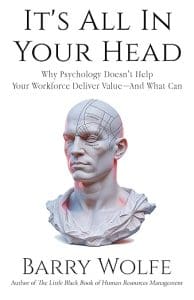About It’s All In Your Head: Why Psychology Doesn’t Help Your Employees Deliver Value – And What C by Barry Wolfe
Employers spend billions of dollars each year on personality tests, competency models, and training on psychological theories. So why are employee engagement and retention at record-low levels?
In this provocative book, Barry Wolfe, author of the bestseller The Little Black Book of Human Resources Management, presents an uncompromising look at the business of selling psychology to business.
You’ll learn:
– How businesses embraced psychological testing before anyone had proved it worked
– How a pseudoscientific defense of sexual fetishism became the basis for some of the world’s most widely-used personality tests
– How psychologist Abraham Maslow ruined the work world
– The billion-dollar management and learning myths addling modern workplaces
– The scandalous fudging that allows psychological research to “prove” literally anything
Wolfe then proposes a top-down rethinking of people management, structured around the value a business exists to create for customers, investors, communities, and owners. His Value-Centric Leadership process introduces:
– A simple document for getting everyone on the same page (that strategic plans, mission/vision statements, and core values apparently don’t)
– Job description, performance appraisal, and compensation alternatives that clarify not just expectations, but opportunities—not as what people do, but as what they’re hired to deliver
– Steps for leveraging value in recruiting, selecting, and onboarding new contributors
Grounded in extensive research and business experience, It’s All In Your Head shows how management took itself off track and shows the way back on—by helping your people help your business succeed.
Buy the book, and follow the author on social media:
Author Bio:
I started working for my dad in his manufacturing company, driving a forklift before I was old enough to drive a car. After high school I toured with a musical group for a few years, which taught me that life on the road is only marginally better than working in a manufacturing plant. So I went to college. I’ve been a senior HR guy and now a consultant for about 30 years.
I’m convinced there’s no better way to help leaders help their people succeed than to focus not on personality traits or such, but on gaining a clearer understanding of what the organization wants to buy from each person and then helping employees deliver. Helping make that happen really fires me up.
When I’m not working, I’m doing whatever my wife and six kids want from me. When they’re otherwise occupied, I play guitar (mostly classical), sing in church, ride my bike, and play board games.
